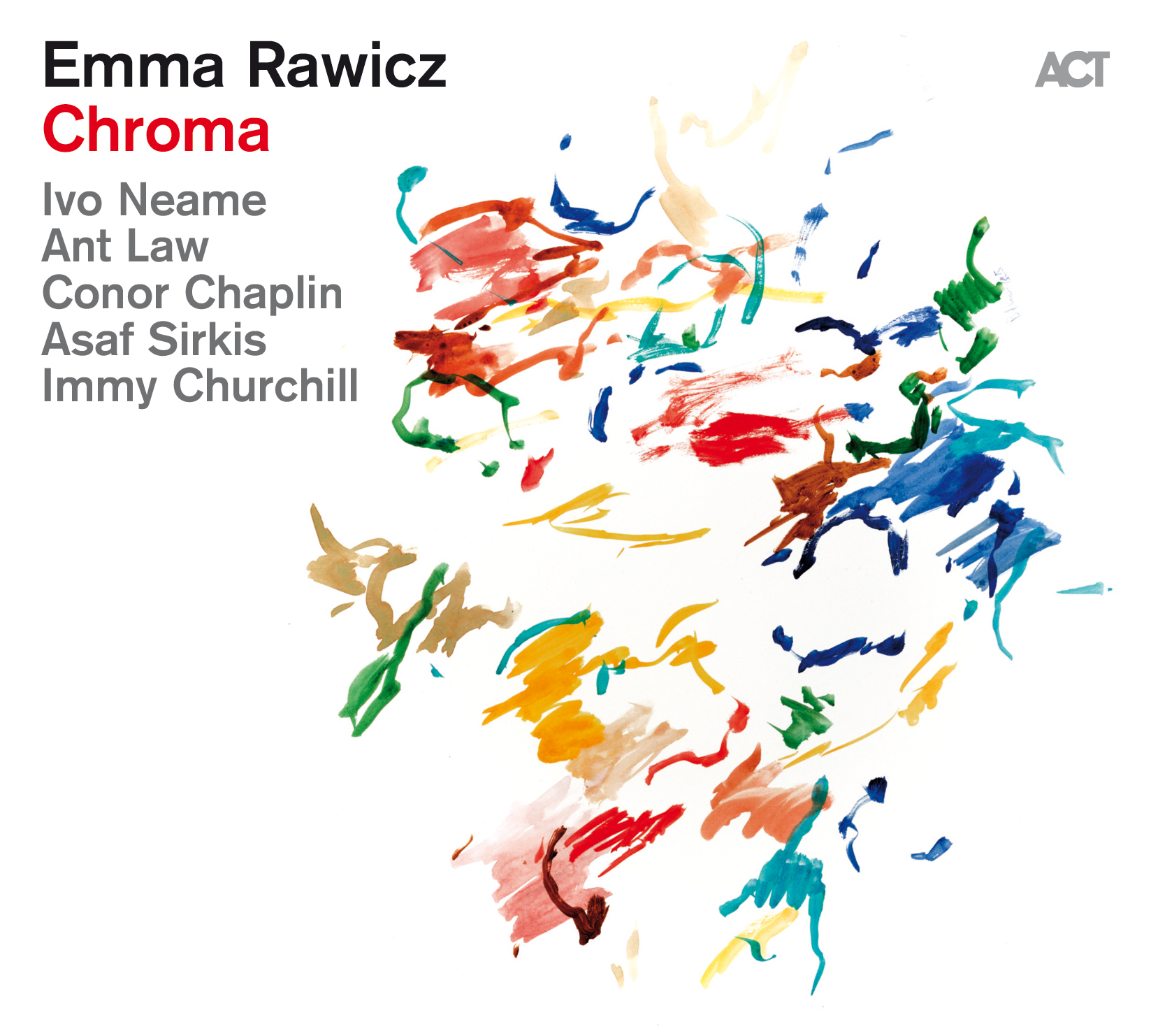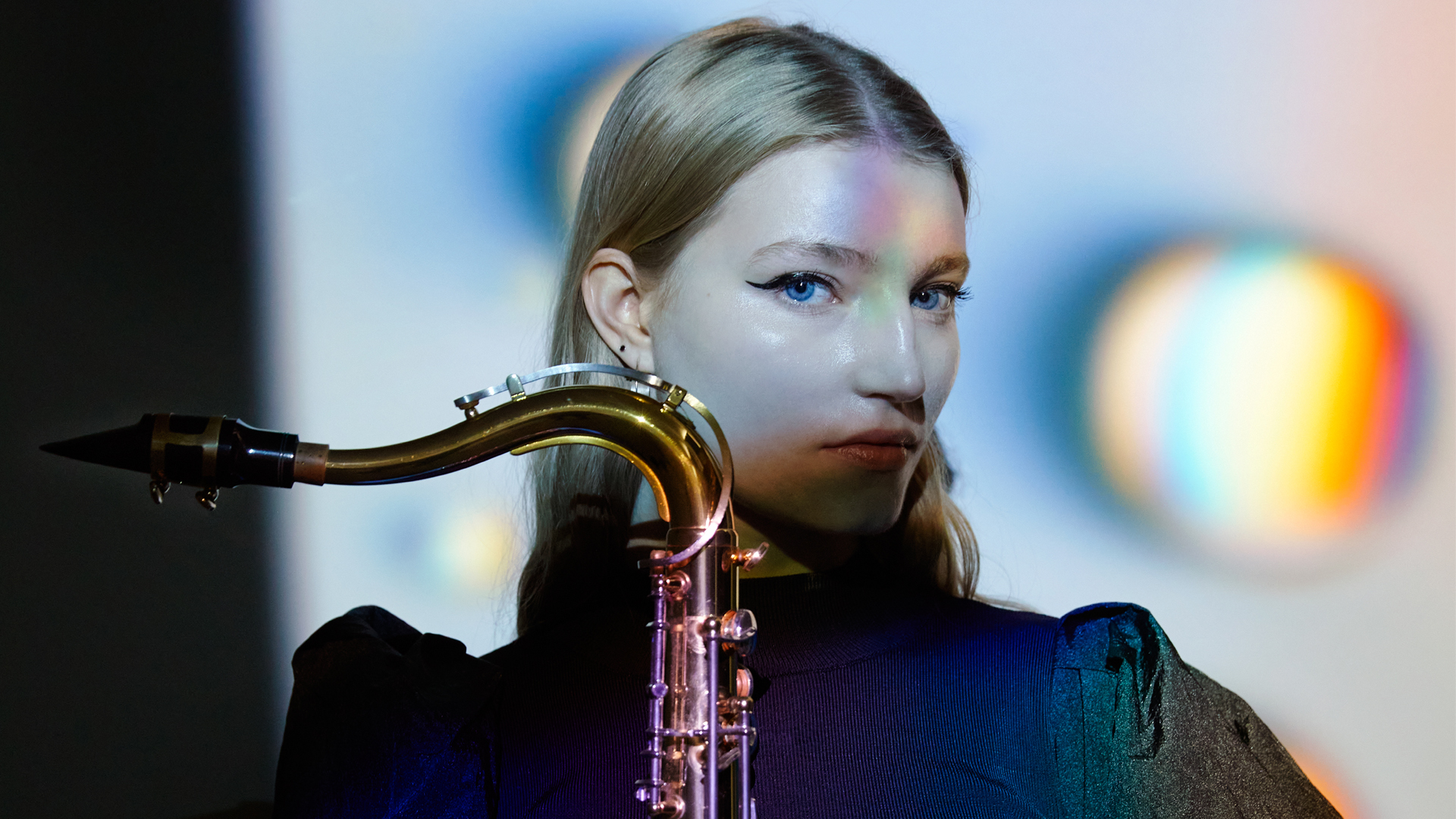Back
VÖ: 25.08.2023
Genre: Saxophone Jazz
Emma Rawicz / tenor saxophone, flute, bass clarinet
Ivo Neame / piano
Ant Law / guitar
Conor Chaplin / upright & electric bass
Asaf Sirkis / drums, vocals
Immy Churchill / vocals
Music composed, arranged and produced by Emma Rawicz
the art in music: cover art "Flow", 2021 by Uwe Kowski
"An astonishing new talent" (Jamie Cullum), “a name on everyone’s lips right now” (BBC 3) and "a force to be reckoned with" (Jazzwise).
At the age of just twenty-one Emma Rawicz has already sown many of the important seeds for a major career. She clearly can be considered a part of the wave of Young British Jazz which has been making its mark worldwide. The North Devon-born saxophonist, whose Polish surname comes from her Warsaw-born grandfather, who settled in the UK during World War 2, has already led her band for several international festival appearances, single-handedly negotiated and managed a seventeen-concert UK tour for her quintet and recently founded her own big band. She has headlined at Ronnie Scott’s, won the award for Newcomer of the Year at the 2022 Parliamentary Jazz Awards. Emma Rawicz has a Jazz FM Awards nomination to her name, as well as being a finalist in the BBC Young Jazz Musician competition. “Chroma”, her ACT debut, marks a new and important step.
Emma Rawicz’s interest in music came early: she started composing for the instruments she knew – piano and violin – as a seven year-old. “They were just sketches really, I had no idea of a process,” she remembers. The interest in jazz and the saxophone came later, at fifteen. She was given a place to study the instrument for two years at Chetham’s in Manchester, one of the UK’s top specialist music schools, and made astonishingly rapid progress technically and made huge gains in confidence. From there she went to the Royal Academy, where her playing, arranging and composing skills have developed massively. Her musical enthusiasms are broad. For example, she has a real enthusiasm and knowledge of singer-songwriters. However, it is above all her deep listening to the tenor saxophonists who found their own ways with melody, harmony, timbre and story-telling, Joe Henderson and Wayne Shorter, which can be heard on “Chroma”. Incidentally, Rawicz also proved to be smart, creative and productive during corona times: she started posting practice routines on her tenor sax, flute and bass clarinet on Instagram. The lasting effect of that initiative is impressive: she now has almost 50,000 followers on the social media platform.
The album title "Chroma" (the Greek word for colour or paint) is very significant: Emma Rawicz is a synesthete, in other words, she always involuntarily and simultaneously experiences music through a second sensory pathway, colour. “I can’t do anything else while listening to music because there is always a sensory overload going on as I Iisten,” she says. All of the tracks, with one exception, are named after relatively little-known colours.
The band is mostly made up of the kind of in-demand UK players whom one finds in many contexts: Drummer/percussionist Asaf Sirkis, pianist Ivo Neame and bassist Conor Chaplin have already appeared on ACT albums: Sirkis with Gwilym Simcock, and Neame and Chaplin in bands led by Marius Neset. Guitarist Ant Law has already made his mark with his own albums and with his work with Tim Garland. The less-known name on "Chroma" is Emma’s friend from the same student cohort, vocalist Immy Churchill, another rising star. Rawicz: “Immy has an incredibly wide range of influences from a whole range of songwriters to being deeply into the jazz tradition. She has the knowledge and the open mind to walk into any musical situation without knowledge of the context, and bring her own voice to it.” Their interaction and empathy is one of the joys of this album.
The idea of allowing musicians to bring their own strong musical identities to the band is a key to the way Rawicz leads the band. “For me it is essential to embrace their musical personalities and let them be themselves.” Thus the very first sounds we hear on “Phlox” (the title refers to what Rawicz calls “a pretty unpleasant shade of pink”) are from Asaf Sirkis, a specialist in Konnakol rhythms and ‘talking drums’.The album is cleverly constructed, with a thread running through it of three different readings of the same twelve-bar tune, “Xanadu” (the title refers to a grey-green colour), starting with a first version in rapt calm and progressively becoming more energetic, with the third version in the domain of a prog rock/jazz band such as Marbin. Rangwali (the colour is a light shade of pink/purple), a happy track, brings the richer sounds of Rawicz’s flute and bass clarinet, plus an inexhaustible melodic conversation involving most of the band. "Middle Ground", the only track not named after a colour, opens with the wonderful ebb and flow of the Neame/Chaplin/Sirkis rhythm section, and a limpid melody from Rawicz and Churchill in unison. “Viridian” is a bigger and more complex structure, with happy echoes of Norma Winstone and Kenny Wheeler. “Falu” completes the album with more optimism and a sax work-out where altissimo, multiphonics and ferocious finger-work stand above all as an emphatic declaration of “can-do”.
Watch out for Emma Rawicz. She is a star on the rise. “Chroma” is about colours...and much, much more. It is a major statement and a deeply satisfying album.
Ivo Neame / piano
Ant Law / guitar
Conor Chaplin / upright & electric bass
Asaf Sirkis / drums, vocals
Immy Churchill / vocals
Music composed, arranged and produced by Emma Rawicz
the art in music: cover art "Flow", 2021 by Uwe Kowski
"An astonishing new talent" (Jamie Cullum), “a name on everyone’s lips right now” (BBC 3) and "a force to be reckoned with" (Jazzwise).
At the age of just twenty-one Emma Rawicz has already sown many of the important seeds for a major career. She clearly can be considered a part of the wave of Young British Jazz which has been making its mark worldwide. The North Devon-born saxophonist, whose Polish surname comes from her Warsaw-born grandfather, who settled in the UK during World War 2, has already led her band for several international festival appearances, single-handedly negotiated and managed a seventeen-concert UK tour for her quintet and recently founded her own big band. She has headlined at Ronnie Scott’s, won the award for Newcomer of the Year at the 2022 Parliamentary Jazz Awards. Emma Rawicz has a Jazz FM Awards nomination to her name, as well as being a finalist in the BBC Young Jazz Musician competition. “Chroma”, her ACT debut, marks a new and important step.
Emma Rawicz’s interest in music came early: she started composing for the instruments she knew – piano and violin – as a seven year-old. “They were just sketches really, I had no idea of a process,” she remembers. The interest in jazz and the saxophone came later, at fifteen. She was given a place to study the instrument for two years at Chetham’s in Manchester, one of the UK’s top specialist music schools, and made astonishingly rapid progress technically and made huge gains in confidence. From there she went to the Royal Academy, where her playing, arranging and composing skills have developed massively. Her musical enthusiasms are broad. For example, she has a real enthusiasm and knowledge of singer-songwriters. However, it is above all her deep listening to the tenor saxophonists who found their own ways with melody, harmony, timbre and story-telling, Joe Henderson and Wayne Shorter, which can be heard on “Chroma”. Incidentally, Rawicz also proved to be smart, creative and productive during corona times: she started posting practice routines on her tenor sax, flute and bass clarinet on Instagram. The lasting effect of that initiative is impressive: she now has almost 50,000 followers on the social media platform.
The album title "Chroma" (the Greek word for colour or paint) is very significant: Emma Rawicz is a synesthete, in other words, she always involuntarily and simultaneously experiences music through a second sensory pathway, colour. “I can’t do anything else while listening to music because there is always a sensory overload going on as I Iisten,” she says. All of the tracks, with one exception, are named after relatively little-known colours.
The band is mostly made up of the kind of in-demand UK players whom one finds in many contexts: Drummer/percussionist Asaf Sirkis, pianist Ivo Neame and bassist Conor Chaplin have already appeared on ACT albums: Sirkis with Gwilym Simcock, and Neame and Chaplin in bands led by Marius Neset. Guitarist Ant Law has already made his mark with his own albums and with his work with Tim Garland. The less-known name on "Chroma" is Emma’s friend from the same student cohort, vocalist Immy Churchill, another rising star. Rawicz: “Immy has an incredibly wide range of influences from a whole range of songwriters to being deeply into the jazz tradition. She has the knowledge and the open mind to walk into any musical situation without knowledge of the context, and bring her own voice to it.” Their interaction and empathy is one of the joys of this album.
The idea of allowing musicians to bring their own strong musical identities to the band is a key to the way Rawicz leads the band. “For me it is essential to embrace their musical personalities and let them be themselves.” Thus the very first sounds we hear on “Phlox” (the title refers to what Rawicz calls “a pretty unpleasant shade of pink”) are from Asaf Sirkis, a specialist in Konnakol rhythms and ‘talking drums’.The album is cleverly constructed, with a thread running through it of three different readings of the same twelve-bar tune, “Xanadu” (the title refers to a grey-green colour), starting with a first version in rapt calm and progressively becoming more energetic, with the third version in the domain of a prog rock/jazz band such as Marbin. Rangwali (the colour is a light shade of pink/purple), a happy track, brings the richer sounds of Rawicz’s flute and bass clarinet, plus an inexhaustible melodic conversation involving most of the band. "Middle Ground", the only track not named after a colour, opens with the wonderful ebb and flow of the Neame/Chaplin/Sirkis rhythm section, and a limpid melody from Rawicz and Churchill in unison. “Viridian” is a bigger and more complex structure, with happy echoes of Norma Winstone and Kenny Wheeler. “Falu” completes the album with more optimism and a sax work-out where altissimo, multiphonics and ferocious finger-work stand above all as an emphatic declaration of “can-do”.
Watch out for Emma Rawicz. She is a star on the rise. “Chroma” is about colours...and much, much more. It is a major statement and a deeply satisfying album.
Jazzwise Magazine states: "Emma Rawicz is
already the real deal!"
high-quality download powered by Qobuz
high-quality download powered by Qobuz

